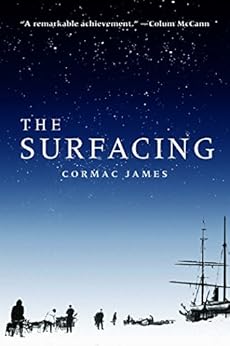It’s May 1 and hopefully winter is well and truly gone, so it’s time to get ready for warmer weather. To cool off on a hot day, there’s nothing like a “cold” read.
I came
across this great article in The New
Yorker about nineteenth-century polar fiction: http://www.newyorker.com/magazine/2017/04/24/polar-expressed?reload. It mentions works by Mary Shelley, Edgar
Allan Poe, Jules Verne, Wilkie Collins, and Charles Dickens.
I’ve read a
couple of books that are examples of twenty-first-century polar fiction.
Last year,
I read The North Water by Ian McGuire: It is
1859 and the owner of the whaling ship Volunteer
is putting together a crew. Amongst that
crew is Henry Drax, a harpooner who within the opening pages shows himself to
be a murderer. Also aboard is Patrick
Sumner, a decent but weak man addicted to opium who serves as ship’s doctor. The rest of the crew members are a rather
unpleasant lot, and the trip soon becomes nightmarish with violence being
routine. And, as expected in the Arctic
setting, there is soon a struggle for survival.
See my review at http://schatjesshelves.blogspot.ca/2016/08/review-of-north-water-by-ian-mcguire.html.
My other
reading of modern polar fiction was The
Surfacing by Cormac James: It is
1850; the Impetus is a ship looking
for Franklin’s lost expedition in the high Arctic. Dispatched to the most
northerly unchartered polar region, it becomes stuck in ice with a pregnant
stowaway on board. Here’s my review of
the book:
3
Stars
The novel
is narrated in third person from the point of view of Lieutenant Richard
Morgan, the ship’s second-in-command and the father of the expected child. The
story is much more about his journey of self-discovery than it is about a
journey of exploration.
Morgan’s
usual modus operandi is to run away from problems and responsibilities. When
faced with fatherhood, his initial reaction is to flee; when away from the
stranded ship, he admits that “part of him did not want to return” (157). He
feels he has not “any [attention and affection] to give” (234). Of course,
since the crew is totally isolated and unable to communicate with the outside
world, Morgan has no real option but to accept the role of father: “He would
muster something, he supposed, to meet the need” (234). As one would expect,
his transformation begins with the arrival of the child: “For the first time in
a long time, he heard a call to his better self” (250).
This is
certainly not a novel of plot. For long periods of time, very little happens.
It could be said that the book is about the human capacity to endure. Finding
themselves in a hostile, unforgiving landscape, the crew must strive to
survive. There is much description of shipboard life where the men are forced
to live in close proximity with crew members. Obviously, there is a great deal
of tedium.
The problem
is that the reader experiences tedium when reading the book. The almost 400
pages could be halved and the themes still be well developed. Reading should
not feel like hauling a whaling boat across a frozen wasteland. And after
sacrificing and enduring, the reader is left with few answers since the
conclusion is open-ended. All that is known for certain is that Franklin and
his men are not found; history tells us that. In fact, it was only last year
that the remains of Erebus were found by Canadian scientists and
archaeologists.
I had
difficulty identifying with any of the characters. The ship is an all-male
enclave except for Kitty Rink who upsets the equilibrium. Unfortunately, she is
also a problem for this reader. Her motivation, for example, is unclear. She
wants to escape her life in Greenland, but why would she put her life and that
of her child in jeopardy? It cannot be love she expects from Morgan who shows
himself clearly to be emotionally repressed; for him, she is nothing but a
temporary diversion during a stopover. And when she has one last opportunity to
escape a journey she fully knows will be unrelentingly harsh, if not deadly,
she doesn’t take it?
Several of
the excerpts of reviews included at the beginning of the book praise the
author’s poetic prose. There is certainly a lyrical quality to the writing but,
for me, it is insufficient compensation for the lack of plot in a lengthy
novel. Descriptions of endless snow and ice need not be endless.
This book
seems to be an attempt to extend an Arctic exploration narrative into something
resembling interpretive literature. Unfortunately, it has insufficient
adventure to be the former and includes too much unnecessary detail to qualify
as the best of literary fiction.
Note: I
received an ARC of this book from the publisher via LibraryThing.
To get in the mood, why not listen to Stan Rodgers sing his "Northwest Passage": https://www.youtube.com/watch?v=TVY8LoM47xI?
To get in the mood, why not listen to Stan Rodgers sing his "Northwest Passage": https://www.youtube.com/watch?v=TVY8LoM47xI?

No comments:
Post a Comment